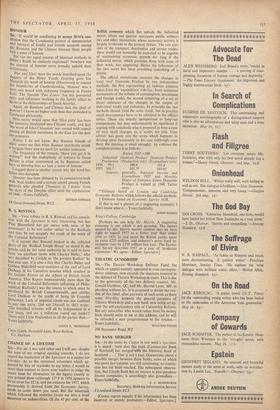SIR,—It would be comforting to accept Strix's con- clusion that
the Communist pattern of denunciation and betrayal of family and friends succeeds among the Russians and the Chinese because these people lack a sense of honour.
But can the equal success of identical methods in Hitler's Reich be similarly explained? Nowhere was the concept of honour more proudly upheld than in Germany. Thet and Ehre' were the words inscribed upon the daggers of the Hitler Youth. Goering gave Jan Masaryk his word of honour (Ehrenwort) to respect the boundaries of Czechoslovakia, 'Honore' was a term one heard with sickening frequency in Fascist Italy. The Spanish Tun d'onor' has not prevented spies and informers working in the family either in Spain or the dictatorships of South America.
Again, do Russians and Chinese lack the ideal of honour? I know no higher code than that embodied in Confucian philosophy. Strix surely would agree that 'filial piety' has been for centuries inculcated into Chinese youth, and that the word of John Chinaman' was quoted with respect among all British merchants in the East for the past two centuries.
Russia I do not know. But Russian friends of mine assure me that when Russian merchants struck a bargain there was no need for written contracts.
The frequency of the remark, 'Have you got it in Writing?' and the multiplicity of lawyers in Great Britain is often commented on by Russians exiled here as showing that we lack a sense of honour.
I suggest there is another reason why the word has fallen into disrepute.
'Honour' has been debased by its associations both with Nazi leaders and a certain school among French generals who pleaded 'Phonneur de l' Armee' from the days of the Dreyfus affair until the capitulation of 1940.—Yours faithfully,
14 Great Ormond Street, WC1
GEORGE EDINGER














































 Previous page
Previous page